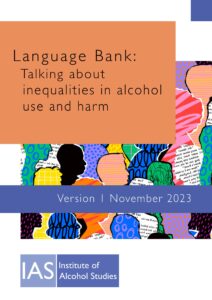View this report

The purpose of this language bank is to support the delivery of IAS’s 2023-26 strategy, which has a focus on inequalities.
Language is important, and terminology can be empowering as well as potentially harmful.
This guide is to be used in conjunction with existing resources to talk about alcohol. These include IAS’s communications strategy (internal document), the Alcohol Health Alliance’s language bank (internal document), and other organisations’ resources, such as Scottish Drugs Forum. This guide can be used alongside further resources and tools for addressing risk of bias in research, assessing or analysing data, or reporting findings, for example the VISION consortium’s data assessment tool or the government’s social research profession’s guide to inclusive social research practices.
This language bank covers language for characteristics relating to inequalities, including but not limited to characteristics protected by the Equality Act 2010.
This guide is not exhaustive, and resources are provided for further reading to tailor language to specific projects.
This document will also be reviewed and updated as and when the need arises because language changes over time. We welcome suggestions for how to update the language bank.
Principles of person-first language
As noted in the Alcohol Health Alliance language bank (internal), person-first language is recommended for talking about substance use. This means structuring sentences to name the person first and the condition or disease they have second.
Similar principles can be applied to describe aspects of identity in many cases. Person-first language articulates that one aspect of someone’s identity is not the primary characteristic of that individual’s identity.
For example:
- instead of saying “wheelchair user” you can say “person who uses a wheelchair”
- instead of “Sikhs” you can say “people belonging to the Sikh religion”
- instead of “low-income men” you can say “men on low incomes”
Person-first language is not always appropriate for all aspects of identity, or at all times, but it is a useful guiding principle.
Read Dr Boniface’s blog for more information on the development of the language bank.
View this report
